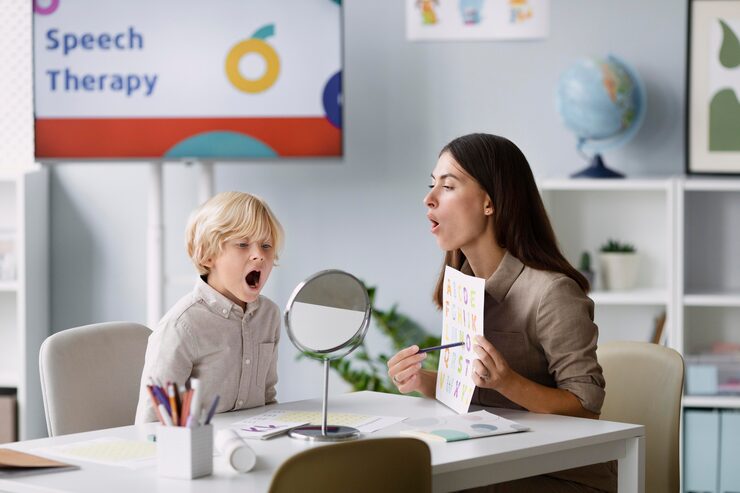Pediatric Speech Therapy: Helping Kids Actually Get Heard

Okay, let’s get real for a second communication isn’t just “nice to have.” It’s everything. It’s how we bond with people, wrangle what we want, and maybe throw a little sass at our siblings. For kids, talking and understanding stuff is the golden ticket to learning, making friends, and generally not losing their minds in the playground politics. But some kids? They hit roadblocks and that’s where pediatric speech therapy crash-lands into the picture like a superhero with flashcards.
What The Heck Is Pediatric Speech Therapy Anyway?
Basically, it’s pro-level help for kids who aren’t breezing through the whole talking/listening thing. We’re talking speech-language pathologists—call ’em SLPs if you’re in the know—who work with babies, loud preschoolers, and moody teens alike. Targets? Depends. Some kids mumble their words, some can’t spit out the right sentence, some sound like robots, and a bunch struggle to get food down the right way.
Let’s break it down:
- Articulation: Making words clear, not a garbled mess
- Language: Understanding and actually using words (thanks, Dora the Explorer)
- Stuttering: Helping speech flow without road bumps
- Voice: Pitch and volume, not sounding like a frog at a rock concert
- Feeding: Swallowing issues, because yeah, that’s connected too
The big dream? Get kids talking, understanding, and owning conversations—at home, school, or wherever.

Why Do Kids Even Need Speech Therapy?
Look, every kid’s got timelines. Some hit milestones early, some take long naps instead. But if your kiddo is way behind on the communication front, it usually triggers a “wait…should I worry?” moment. Here’s the usual suspects:
- Speech Delays: Muffled words, or it sounds like they’ve got a mouthful of marbles
- Language Delays: “Huh?” a lot, struggles following directions, vocab from the stone age
- Stuttering: Speech gets stuck—think skipping records
- Voice Disorders: Weird pitch, grating sound, or losing their voice shouting at Fortnite
- Developmental Differences: Autism, Down syndrome—anything that bumps into communication
- Hearing Struggles: If you can’t hear much, you can’t really mimic the sounds you’re supposed to, right?
How Does This Speech Magic Actually Happen?
No cookie-cutter stuff here—it’s 100% DIY, tailored to the kid. Activities feel like playtime, because a) kids are not down for boring drills, and b) play is sneaky learning. Typical tools of the trade:
- Games, toys, beanbags flying everywhere
- Mouth gym (articulation drills)
- Stretching sentences, building vocab towers
- Bumpy speech hacks (help with stuttering)
- And parents? Oh yeah, you’ll get homework too. SLPs arm you with tips so you can keep the magic going at home.
Honestly, most of the time it looks like chaos. But trust me, progress happens in the mess.
The Benefits of Pediatric Speech Therapy
It’s not just about saying “banana” correctly, okay? Pediatric speech therapy scores some pretty sweet side effects:
- More confidence (watch your shy kid turn into a chatterbox)
- Schoolwork doesn’t feel like climbing Mount Everest
- Friendships get easier—less awkward moments
- Way fewer meltdowns from not being understood
- Lightning-fast catch on bigger issues if they exist
Bottom line: Once kids can get their ideas out, they start actually living their lives, not just spectating.
When to Seek Help
“Is this normal??” Every parent, at some point. Here’s the basic warning signs:
- Not even babbling or waving by their first birthday? Hmm.
- 18 months and saying, like, three words all day? Eh, that’s not enough.
- Two years old and “me want juice” is still a foreign language? Time to chat with someone.
- Three and you’re translating for them at playdates? Red flag.
- Any age – stuttering like crazy, or the voice sounds like an old car engine.
Trust your gut. If you’re even thinking about it, just reach out early. Seriously, no one ever said, “I wish I’d waited longer to help my kid.”
Wrap-Up
Look, pediatric speech therapy changes lives. Full stop. Speech, language, just… being understood—it’s not fluff. It’s what helps kids ace school, make friends, and grow into their own skin. The sooner you start? The better the story gets.
So if you’re worried, don’t play the waiting game. Get help, get answers, and watch your kid find their voice—literally.